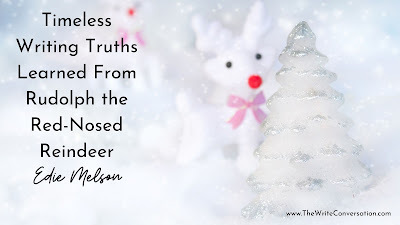Edie Melson's Blog, page 68
December 6, 2023
10 Ways Writing Books is Like Decorating for Christmas

by Lynn H. Blackburn @LynnHBlackburn
I love Christmas. It’s my favorite. It has been since I was a little bitty thing and I could barely sleep on Christmas Eve. I was a present shaker, but I never peeked. The anticipation and excitement were what made it so much fun.
You know what else made it fun?
All the work my mom did to decorate and make thing festive, but I didn’t realize that until I was all grown up and facing the task myself.
I’ve been married for twenty-six years. A mother for almost twenty-one. You’d think I would be a pro at this by now. I know what to expect. I know what to do.
But y’all. This year when my husband and boys brought all the tubs up from the basement, I have to confess…I didn’t want to do it. I didn’t want to move the furniture around. I didn’t want to pack up the things that we usually leave out to make room for the Christmas decorations. I didn’t want to spend the hours it would inevitably take to make everything festive and fun.
I knew it would be worth it. I also knew it would be exhausting. And for a few minutes, I wondered what it would be like if I didn’t do it. I mean, no one is making me. There’s no rule that says you have to decorate your entire house for Christmas. Plenty of people don’t. And those people don’t spend the weekend after Thanksgiving up to their eyeballs in garland and lights. They get to watch football and Christmas movies while drinking hot chocolate.
Y’all. They get to take naps! Their lives are so much less stressful!
Why did I have to be one of those people who just loves Christmas? Who just can’t stop herself from wrapping the stair bannisters in garland or buying a tree that could possibly fill in at Rockefeller Center? (Okay, not really, but it’s close!) What is wrong with me that I couldn’t leave well enough alone and had to try the latest viral TikTok and decorate a tension rod with garland and lights and sprigs of berries so I could have even more decorations?
It was two days of work. Hard work. My back ached. My feet hurt. I was so stinking tired.
But when I finally sat down and looked at the tree, I felt such a sense of rightness. I knew that despite my whining and drama at the beginning of the process, I would have been miserable if I hadn’t done it. If I hadn’t put in the work to create something magical. And now it’s done, and we get to enjoy it for the entire season. And I know that when next year rolls around, I will do it all over again. I might even add in a few more things just because I can’t help myself.
Now, I promise you that there was no spiked eggnog involved in what happened next. But as I sat in the glow of the twinkle lights, I had a little epiphany.
Why Writing Books is Like Decorating for Christmas
#1. You will not fit in with everyone else. Not everyone wants to write books and that’s okay.
#2. You will have to move things around, get rid of some things, rearrange your schedule, and even put some things off for months in order to make room for writing.
#3. You will experience pangs of jealousy when you see other people having fun while you’re squirreled away in your writing cave living on caffeine and chocolate.
#4. You will not always want to write. You will have days when you despair over why you are the way you are. You will wish you were wired differently and that you could just relax like a normal person.
#5. You will try to relax like a normal person, and you might even pull it off for a while, but eventually you will be compelled to write.
#6. You will try to be reasonable, but then you’ll have an idea for a novella or a flash fiction piece or a poetry collection and before you know it, you’ll be writing even more than you’d originally planned to.
#7. You will experience back pain, arm pain, neck pain, headaches, eye strain, and a host of other physical maladies. (These will get worse as you get older.)
#8. You will work so hard you will question all your life decisions that brought you to your present condition.
#9. You will finish your manuscript, and you will feel a sense of rightness. You will know without any doubt that writing was the right decision.
#10. You will be miserable if you don’t write, so no matter how tired you are, you’re totally going to do it all over again.
And with that, I wish you all a very Merry Christmas and a Happy New Year. I can’t wait to see what we write in 2024. (But hey, if anyone wants to come over around January 6th to help me put all these decorations away, that would be great! I’m on a deadline!)
Grace and peace,Lynn
TWEETABLE10 Reasons Writing Books is Like Decorating for Christmas from author @LynnHBlackburn on @EdieMelson (Click to Tweet)
 Lynn H. Blackburn loves writing romantic suspense because her childhood fantasy was to become a spy, but her grown-up reality is that she's a huge chicken and would have been caught on her first mission. She prefers to live vicariously through her characters and loves putting them into all kinds of terrifying situations while she's sitting at home safe and sound in her pajamas!
Lynn H. Blackburn loves writing romantic suspense because her childhood fantasy was to become a spy, but her grown-up reality is that she's a huge chicken and would have been caught on her first mission. She prefers to live vicariously through her characters and loves putting them into all kinds of terrifying situations while she's sitting at home safe and sound in her pajamas! Unknown Threat, the first book in her Defend and Protect series, was a 2021 Christy Award finalist and her previous titles have won the Carol Award, the Selah Award, and the Faith, Hope, and Love Reader’s Choice Award. Malicious Intent, the second book in the series, released March 2022.
She is a frequent conference speaker and has taught writers all over the country. Lynn lives in South Carolina with her true love and their three children. You can follow her real life happily ever after by signing up for her newsletter at LYNNHBLACKBURN.COMand @LynnHBlackburn on BOOKBUB, FACEBOOK, TWITTER, PINTEREST, and INSTAGRAM.
Published on December 06, 2023 22:00
December 5, 2023
Should a Writer Use First Person or Third Person?

by Sarah Sally Hamer @SarahSallyHamer
I get asked this question all the time. Which is better, first or third person? Unfortunately, there is no “right” answer. They both work, exactly as they’re meant to, but it depends on the situation. The problem is that, all too often, a writer doesn’t really understand what each one entails and, if a mistake is made, it can ruin the whole book. So, before we can answer the question, let’s define them.
First person is where the protagonist in a scene, chapter, or entire book is speaking as they think. Using terms such as “I”, “me”, “us”, “we”, etc., and the story is told ONLY from through that person’s eyes and thoughts and experiences. Katniss Everdeen in Hunger Games (the book, NOT the movie), is in first person and we know everything that she wants to tell us, from her memories of her father’s death to how she feels about Gale (although much of that is in her actions, not her thoughts), and how she feels about Peeta. Keep in mind that, when the movie was filmed, the production company was forced to give a point of view to other characters to help everything make sense.
Until the last twenty years or so, first person was not widely used in commercial fiction but lately it’s become much more popular. It does have its limits, though, and needs to play within the “rules” of first person.The reader will know everything the protagonist knows (or, as I said, willing to share).The reader will ONLY know what the protagonist knows or shares.The protagonist can only know what is told to him or her. The POV character can be more readily understood by the reader.First person viewpoint usually—and most effectively—is used throughout the story. Some folks bounce between first and third but it can easily confuse the reader, probably the worst thing to do.Some readers are adverse to first person and won’t read it no matter how good the story is.
Third person, on the other hand, allows a lot more leeway for the writer to introduce information. The pronouns used are “he/she”, “him/her”, “them/they” and the story can be told by many characters. Think Lord of the Rings. Again, books, not movies. We are distanced from the characters to some point. Also:The reader can learn things from different characters.Point of view can more easily be switched between multiple characters.
Think of it this way:
Your character is standing on an empty stage with no lights except a single spotlight pointed at her (we’ll call her Laurel). Laurel isn’t able to see anything around her—front, side, or back—unless someone or something is included in that spotlight. She’s holding a mirror in her hands. So, the play starts. The audience can easily see her because she’s in the spot and all we get is what she says, does, or thinks. Another character, Simon, walks up to her and Laurel tilts the mirror so part of the spot shines on him. Now, Laurel can see him and talk to him—which the audience can see and hear—but we can’t know what he thinks because he isn’t holding the mirror. Everything he “is” can only be interpreted through Laurel.
As long as she holds the mirror, she is the protagonist, whether first or third person. But for third person, the spot can be expanded and Simon can also be the protagonist if Laurel gives him the mirror.
The point of this is really very simple. The story (at least in this scene) is being told by the person holding the mirror. If the mirror changes hands, whoever holds it becomes the point of view character.
When we’re writing in first person, we have to remember that we can’t hand the mirror to someone else without a big change in scene or chapter.
The main limitations of first-person characterization is that the focus on the main character can be hard to maintain throughout a novel-length book. This character can only get information—and therefore, give it to the reader—through one point of view. Third person point of view can be used very effectively to give a more rounded version.
That being said, some of my favorite books are written by masterful authors in first person. I become so engrossed in a single character and how he or she feels, that I often pay no attention to whether it’s first or third person. Which is hard for me because I’m an editor and read a lot of stories every year. I don’t lose myself in a book very often.
So, my suggestion is, if you want to try a first person story, do so! If you find it doesn’t work for you, changing it from first to third takes a little bit of finagling but it can be done effectively.
Do you like first person point of view? Why or why not?
TWEETABLEShould a Writer Use First Person or Third Person? insight from @SarahSallyHamer on @EdieMelson (Click to Tweet)
 Sarah (Sally) Hamer, B.S., MLA, is a lover of books, a teacher of writers, and a believer in a good story. Most of all, she is eternally fascinated by people and how they 'tick'. She’s passionate about helping people tell their own stories and has won awards at both local and national levels, including two Golden Heart finals.
Sarah (Sally) Hamer, B.S., MLA, is a lover of books, a teacher of writers, and a believer in a good story. Most of all, she is eternally fascinated by people and how they 'tick'. She’s passionate about helping people tell their own stories and has won awards at both local and national levels, including two Golden Heart finals.A teacher of memoir, beginning and advanced creative fiction writing, and screenwriting at Louisiana State University in Shreveport for over twenty years, she also teaches online for Margie Lawson at WWW.MARGIELAWSON.COM. Sally is a free-lance editor and book coach, with many of her students and clients becoming successful, award-winning authors. You can find her at HAMERSE@BELLSOUTH.NET or WWW.SALLYHAMER.BLOGSPOT.COM
Published on December 05, 2023 22:00
December 4, 2023
Can Your Writing Pass the Holly (Jolly) Test?

by PeggySue Wells @PeggySueWells
Can your writing pass the Holly test? Can mine?
As a young adult, one of my daughters was particularly picky about reading material. If the first line of a book captured her attention, she read the first paragraph. If the first paragraph was worth her time, she continued through the first chapter. When a first chapter was compelling, she read the book. For the books that held her interest, she sought other titles by the same author.
Holly’s opinions proved particularly helpful for our writers group. We could run our first lines past her discerning eye. Though Holly has grown and moved on to a career and family of her own, our writers group continues to use her criteria to help one another write well.
Does the first line of your writing capture the reader enough so the reader continues to read the first paragraph?
Once a project is complete, many authors return to the first line. Do these words grab the reader’s attention? Create curiosity? Compel the reader to read more?
Some interest-grabbing first lines include:
The Herdmans were absolutely the worst kids in the history of the world.Best Christmas Pageant Ever by Barbara Robinson
The crowd was small for a hanging. Journey to Riverbend by Henry Mclaughlin
“Where's Papa going with that ax?” said Fern to her mother as they were setting the tablefor breakfast. Charlotte’s Web by E.B. White
Once there were four children whose names were Peter, Susan, Edmund, and Lucy. The Lion, the Witch, and the Wardrobe by C.S. Lewis
Call me Ishmael. Moby Dick by Herman Melville
In our family, there was no clear line between religion and fly fishing.A River Runs Through It by Norman Maclean
When he was nearly thirteen, my brother Jem got his arm badly broken at the elbow.To Kill A Mockingbird by Harper Lee
You wouldn’t think we’d have to leave Chicago to see a dead body. A Long Way For Chicago by Richard Peck
The drought had lasted now for ten million years, and the reign of the terrible lizards hadlong since ended.2001: A Space Odyssey by Arthur C. Clarke
You better not never tell nobody but God. The Color Purple by Alice Walker
It was a bright cold day in April, and the clocks were striking thirteen.1984 by George Orwell
It is a truth universally acknowledged, that a single man in possession of a good fortune, must be in want of a wife.Pride and Prejudice by Jane Austen
When Mary Lennox was sent to Misselthwaite Manor to live with her uncle everybody said she was the most disagreeable-looking child ever seen.The Secret Garden by Frances Hodgson Burnett
It was a pleasure to burn. Fahrenheit 451 by Ray Bradbury
All happy families are alike; each unhappy family is unhappy in its own way. Anna Karenina by Leo Tolstoy
This is my favorite book in all the world, though I have never read it.The Princess Bride by William Goldman
Mr. and Mrs. Dursley of number four, Privet Drive, were proud to say that they were perfectly normal, thank you very much.Harry Potter And The Philosopher’s Stone by J.K. Rowling
It was the best of times, it was the worst of times, it was the age of wisdom, it was the age of foolishness, it was the epoch of belief, it was the epoch of incredulity, it was the season of Light, it was the season of Darkness, it was the spring of hope, it was the winter of despair, we had everything before us, we had nothing before us, we were all going direct to Heaven, we were all going direct the other way. A Tale of Two Cities by Charles Dickens
All children, except one, grow up.Peter Pan by J.M. Barrie
In a hole in the ground there lived a Hobbit.The Hobbit by J.R.R. Tolkien
The year 1866 was signalized by a remarkable incident, a mysterious and inexplicable phenomenon, which doubtless no one has yet forgotten. Twenty Thousand Leagues Under The Sea by Jules Verne
It was a queer, sultry summer, the summer they electrocuted the Rosenbergs, and I didn't know what I was doing in New York. The Bell Jar by Sylvia Plath
There was a boy called Eustace Clarence Scrubb, and he almost deserved it. Voyage of the Dawn Treader by C.S. Lewis
Tuesday was a fine California day, full of sunshine and promise, until Harry Lyon had to shoot someone at lunch. Dragon Tears by Dean Koontz
Once a piece is complete, many authors return to the beginning. Does the first line compel the reader to continue through the first paragraph?
Of course, having learned this principle along the way, I considered my own first lines. How did I do in my books? Would these pass the Holly test? Would you keep reading? Captain Michael Northington looked toward the patient’s room. Chasing SunriseShanghai. He hated the place. The PatentHis box was being pried open. Secrecy OrderMallory Wayne chambered a round in her Sig Sauer and holstered the gun inside her jacket. Unnatural Cause“Here they come!” Homeless for the HolidaysOn the day I was born, France was free. The Girl Who Wore Freedom“He’s gone.” The Ten Best Decisions A Single Mom Can MakeGlancing at the time, Larkin Hammond knew she would land in plenty of time to sweep her husband away from the office to their surprise date. A Baby in the BarnTrina Troyer perched on the stool at the Troyer Elevator check-out counter. Tea for TwoWhat do I do now? Not Just Once A YearMoving into the fifth month of pregnancy, I was awaiting the butterfly kicks I should feel any day. When A Baby Dies
Now take a look at your completed manuscripts. Would you keep reading based on the first line? Does your first line pass the Holly test? Compel readers to keep going?
Remember:Your first line prompts the reader to read the first paragraph.The first paragraph invites the reader to read the first chapter.The first chapter gets the reader to read the book.The last chapter sells your next book.
Before you publish, double-check the first sentence to see if the beginning elicits curiosity to see what happens next. If you wonder, post your first line to your audience and ask for their opinion. Readers, like Holly, can be counted on to give valuable feedback.
What is your favorite opening line in a book?
TWEETABLECan Your Writing Pass the Holly (Jolly) Test? Tips from @PeggySueWells on @EdieMelson (Click to Tweet)
 Tropical island votary and history buff, PeggySue Wells parasails, skydives, snorkels, scuba dives, and has taken (but not passed) pilot training. Writing from the 100-Acre Wood in Indiana, Wells is the bestselling author of thirty books including The Slave Across the Street, Slavery in the Land of the Free, Bonding With Your Child Through Boundaries, Homeless for the Holidays, Chasing Sunrise, and The Ten Best Decisions A Single Mom Can Make. Founder of SingleMomCircle.com, PeggySue is named for the Buddy Holly song with the great drumbeat. At school author visits, she teaches students the secrets to writing and speaks at events and conferences. Connect with her at www.PeggySueWells.com, on Facebook at PeggySue Wells, and LinkedIn at linkedin.com/in/peggysuewells
Tropical island votary and history buff, PeggySue Wells parasails, skydives, snorkels, scuba dives, and has taken (but not passed) pilot training. Writing from the 100-Acre Wood in Indiana, Wells is the bestselling author of thirty books including The Slave Across the Street, Slavery in the Land of the Free, Bonding With Your Child Through Boundaries, Homeless for the Holidays, Chasing Sunrise, and The Ten Best Decisions A Single Mom Can Make. Founder of SingleMomCircle.com, PeggySue is named for the Buddy Holly song with the great drumbeat. At school author visits, she teaches students the secrets to writing and speaks at events and conferences. Connect with her at www.PeggySueWells.com, on Facebook at PeggySue Wells, and LinkedIn at linkedin.com/in/peggysuewells
Published on December 04, 2023 22:00
December 3, 2023
Timeless Writing Truths Learned From Rudolph the Red-Nosed Reindeer

by Edie Melson @EdieMelson
I love all the Christmas specials that come around every year during the holidays, and Rudolph the Red-Nosed Reindeer has always been one of my favorites. I identify with his lack of self-confidence, his heart for his friends and especially his gumption when Santa called on him to step up and guide the sleigh that night.
And it occurs to me that, as writers, there are a lot of valuable lessons in this holiday tale.
10 Timeless Writing Truths:1. We’re all born with a special gift. 2. At some point we all feel like that special gift is a curse.3. Hiding who we really are brings out the bullies and naysayers.4. We all need time to mature into our gift.5. Trying to live up to the image of who others think we should be won’t bring anything but trouble and heartache.6. True friends will see beyond our differences and embrace the essence of who we are.7. We’re given that special gift for a reason and a purpose.8. Running away from who we are doesn’t ever solve anything.9. There will come a time when you have to decide to work within your gift, not around it. And the best lesson of all . . . 10. Being who God meant you to be will bless others as much as you.
How about you? Which one of these thoughts resonates with you? Be sure to share your thoughts below in the comments section.
TWEETABLETimeless Writing Truths Learned From Rudolph the Red-Nosed Reindeer from @EdieMelson (Click to Tweet)
 Edie Melson is a woman of faith with ink-stained fingers observing life through the lens of her camera. No matter whether she’s talking to writers, entrepreneurs, or readers, her first advice is always “Find your voice, live your story.” As an author, blogger, and speaker she’s encouraged and challenged audiences across the country and around the world. Her numerous books reflect her passion to help others develop the strength of their God-given gifts and apply them to their lives. Connect with her on her website, through Facebook, Twitter and Instagram.
Edie Melson is a woman of faith with ink-stained fingers observing life through the lens of her camera. No matter whether she’s talking to writers, entrepreneurs, or readers, her first advice is always “Find your voice, live your story.” As an author, blogger, and speaker she’s encouraged and challenged audiences across the country and around the world. Her numerous books reflect her passion to help others develop the strength of their God-given gifts and apply them to their lives. Connect with her on her website, through Facebook, Twitter and Instagram.
Published on December 03, 2023 22:00
December 2, 2023
Light Words in the Night

by Audrey Frank @AudreyCFrank
In the beginning was the Word, and the Word was with God, and the Word was God. He was with God in the beginning. Through him all things were made; without him nothing was made that has been made. In him was life, and that life was the light of all mankind. The light shines in the darkness, and the darkness has not overcome it (John 1:1-5).
The Maker of Words took up His pen,Its ink chamber filled with light;Across the skies of Bethlehem,He wrote Light words in the night.
Like a star, the First Word rose,Shimmering, sparkling, in the dark;Announcing hope, He promised peace,For every human heart.
The incandescent Word of GodPushed away the darkness;Overcoming, lightening Word,Made in human likeness.
Those who wish to steward wordsWould wisely keep in mind,The Word Himself came at Christmas;In Him your words you’ll find.
Fill our ink chambers with Your light,Luminescent Word of Life;Guide our nibs across the page;Make us Your sacred scribes.
This Christmas, move our pens to writeAcross the darkness with Your light.The Word is rising over the land;Light still shines in the night.
TWEETABLELight Words in the Night, beautiful insight from author @AudreyCFrank on @EdieMelson (Click to Tweet)
 Audrey Frank is an author, speaker, and storyteller. The stories she shares are brave and true. They give voice to those whose words are silenced by shame, the hard things in life that don’t make sense, and the losses that leave us wondering if we will survive. Audrey and her family have spent over twenty years living and working among different cultures and world views, and she has found that God’s story of redemption spans every geography and culture. He is the God of Instead, giving honor instead of shame, gladness instead of mourning, hope instead of despair. Although she has three different degrees in communication and intercultural studies, Audrey’s greatest credential is that she is known and loved by the One who made her.
Audrey Frank is an author, speaker, and storyteller. The stories she shares are brave and true. They give voice to those whose words are silenced by shame, the hard things in life that don’t make sense, and the losses that leave us wondering if we will survive. Audrey and her family have spent over twenty years living and working among different cultures and world views, and she has found that God’s story of redemption spans every geography and culture. He is the God of Instead, giving honor instead of shame, gladness instead of mourning, hope instead of despair. Although she has three different degrees in communication and intercultural studies, Audrey’s greatest credential is that she is known and loved by the One who made her.Audrey is the author of Covered Glory: The Face of Honor and Shame in the Muslim World (Harvest House Publishers), an outpouring of Audrey’s heart to introduce others to the God of Instead. Shame is not unique to the developing world, the plight of the women behind veils, young girls trafficked across borders; shame is lurking in hearts everywhere. Through powerful stories from women around the world, Covered Glory illuminates the power of the Gospel to remove shame, giving honor instead. Available at favorite booksellers: BARNES & NOBLE, BOOKS A MILLION, AMAZON.
Published on December 02, 2023 22:00
December 1, 2023
Superhero Tools for Writers: The Gift of Discovery

by Tim Suddeth @TimSuddeth
For the last few months, we’ve looked at superhero tools that writers have in their tool chests. This time we’ll look at a superhero tool that fits right in with the Christmas season.
Finally, we can all agree to start the Christmas season. We’ve spent so much time fussing—I mean discussing—when we should start putting up Christmas decorations and listening to Christmas carols. I admit, it does get messy when the stores put out their Christmas merchandise when we’re still sitting by the pool. And I get where you’re coming from when you say we should first celebrate Thanksgiving (Maybe my favorite holiday.) Or Halloween. Or Labor Day.
But now it’s December. It’s time to blast those carols in our homes and cars, to wish everyone a Merry Christmas and Feliz Navidad, and to dig into those favorite Christmas dishes.
In case you haven’t gathered, I LOVE Christmas. It’s my favorite season of all. (We should start celebrating in July. Right after we take down last year’s tree.)
Foremost, it’s the birthday of my Savior. When God, the Ruler of everything, came down from the golden streets of Heaven and entered a hay-filled stable as a baby. The Creator became a helpless infant.
Now that’s being creative.
When I think of Christmas, I first think of the Christmas story. Then I imagine the spirit of the season. That excitement that tingles in the streets and stores all over the world. The joy of seeing old and new friends. And the spectacle of pageants and festivals that we attend dressed in our finest.
And I remember an old commercial. I don’t have a clue what the product was. But the ad showed a young girl with blond curls opening a gift from under the lit tree. As she opens the present, a glow comes from the box and the look of astonishment shows on her face.
That joy of discovery is such an important part of the Christmas season. The lights, the sounds of the Christmas music and festive crowds, and the smells of the greenery and the food.
Ah, Christmas food; cookies, fudge, and hot chocolate.
It’s that feeling of discovery that we writers hope to give to our readers. Whether it’s through a book or a devotion, fiction or nonfiction, we want to leave them with fresh experiences and feelings. And we can share this gift of discovery in three areas.
Three Areas Writers Use the Superhero Tool of the Gift of Discovery
1. Facts
The goal of much of our writing is to share knowledge. It’s such a pleasure to be able to share things we think are important and meaningful. Seeing that look in their eyes when they get it. Let’s face it, why else would we have math teachers?
2. Emotions
An important role writers have is to help our readers have empathy—to understand the feelings of others in a different culture or situation. That is why telling a story is so powerful. It could be one reason why Jesus spoke in parables. He shared a large part of His teaching through His stories. He could teach for years how His followers should show compassion to others, and we would debate what He truly meant. Instead, He gave us the parable of The Good Samaritan, and we all know and share that story.
3. Experiences
One of the basic purposes of communication was to share our experiences with others. We all have experiences that are uniquely ours, but that we share type the moment with others.
I will always remember the birth of my son. Holding him in my arms in the hospital room and being amazed at all the cars passing by on the highway. Now many if not most of them had had their own children, but didn’t they know what had just happened in that hospital room? The miracle and what a precious bundle I held in my arms. I thought they should all stop and come to our room to celebrate this miracle with us. Sort of like the shepherds. I understood why God wanted someone to share His joy.
By sharing facts, emotions, and experiences, we grow closer and wiser. Writers have the opportunity, and to some degree the responsibility, to show that all of us are part of something bigger, something that holds surprises all around us, something that Someone made just for us.
One of my favorite Christmas stories comes from a master of storytelling, Paul Harvey. It’s the story of The Man and the Birds. (Here’s the link. The Man and the Birds Christmas Story) It’s about a man who saw a flock of birds in the freezing snow. He felt bad for them being out in the cold, so he went outside and opened his barn. But the more he tried to get them to go inside, the more they scattered and flew away. He realized they were afraid of him, even though he was trying to save their lives. And while he thought of different ways to get them to the warmth of the barn, he wished he could become a bird so he could get them to understand.
Then the church bells rang.
So, this Christmas season, in your writing and stories, I hope you’re able to share in spreading this gift. And I hope you hold on to that childlike ability to enjoy discovering the magic of Christmas, of Emmanuel, that will be all around us.
TWEETABLESuperhero Tools for Writers: The Gift of Discovery from @TimSuddeth on @EdieMelson (Click to Tweet)
Don't Miss the Other Posts in This Series of SUPERHERO TOOLS FOR WRITERS
PART 1: 4 SUPERPOWERS EVERY WRITER MUST HAVE
PART 2: LEARNING TO ASK WHY CAN EMPOWER YOUR WRITING
PART 3: A WRITER'S SUPERPOWER: THE ABILITY TO TIME TRAVEL PART 4: SUPERHERO TOOLS FOR WRITERS: THE GIFT OF DISCOVERY
 Tim Suddeth is a stay-at-home dad and butler for his wonderful, adult son with autism. He has written numerous blogs posts, short stories, and three novels waiting for publication. He is a frequent attendee at writers conferences, including the Blue Ridge Mountain Christian Writers Conference and a member of Word Weavers and ACFW. He lives near Greenville, SC where he shares a house with a bossy Shorky and three too-curious Persians. You can find him on Facebook and Twitter, as well as at www.timingreenville.com and www.openingamystery.com.
Tim Suddeth is a stay-at-home dad and butler for his wonderful, adult son with autism. He has written numerous blogs posts, short stories, and three novels waiting for publication. He is a frequent attendee at writers conferences, including the Blue Ridge Mountain Christian Writers Conference and a member of Word Weavers and ACFW. He lives near Greenville, SC where he shares a house with a bossy Shorky and three too-curious Persians. You can find him on Facebook and Twitter, as well as at www.timingreenville.com and www.openingamystery.com.
Published on December 01, 2023 22:00
November 30, 2023
Do Your Track Your Writing Projects?

by A.C. Williams @ACW_Author
What was the first novel you wrote? What year was it? How many words was it? How about the second novel? Or the third?
You may or may not have seen the trend that started growing in social media circles a few months ago where authors post their publication histories. Maybe some folks felt like it was just showing off, but that’s not what it was for me.
The intent of the trend was to demonstrate that a successful author usually has written many “unpublishable” novels before their actual debut. I don’t think we can underscore enough how important that is to realize.
I’ve discovered that it’s very easy for authors to compare themselves to each other. This is common in most artistic pursuits, but with authors I feel like it’s particularly challenging. It takes so long to write a book. It takes so much time and effort to create the material and then you still have to promote it, get it published, and then market it—all while carving out time to write another book. It feels like a lot, because it is a lot. And it’s very tempting to look at another author who seems very successful and think they have it made.
I guarantee they are struggling just as much as you are. Believe me, you don’t want their life.
All that being said, though it was valuable to see the struggles and challenges some of my favorite authors had gone through on the road toward publication, the whole trend made me ask myself a different question:
Do you track your writing projects?
Maybe for some of you who have recently started writing, this question doesn’t feel important. Let me assure you: This matters enormously!
As I sat down to share my own novel writing history, I was astonished at how little detail I had on the books I had finished in the past. Granted, I started writing seriously 30 years ago (no, not an exaggerated number). I thought I’d always done a pretty good job keeping track of what I wrote and when, but apparently my memory isn’t as sharp as it used to be.
When I first started writing, I only thought it was important to count the books I’d written that actually got published. And to a certain extent, that’s true. When you’re talking about a C.V. or your publication credits, you need to focus on the work you’ve done that has actually been published.
But at the same time, you should never diminish the value of the work you did before you got published. For instance, my debut novel (Nameless: The Destiny Trilogy Part One) released in 2014, but I completed my first real story in 1994. Twenty years prior. And I promise you that there was no way I could have written a story of the quality necessary to publish until I’d had 20 years of practice.
Maybe 20 years sounds like a long time, but when you’re learning a craft or a trade, it’s really not. And you have to remember as well that in the early 90s, there weren’t as many resources to train young writers as there are now. And, frankly, I grew up in the Central Midwest, a region that values practicality above artistry. Writing books ain’t practical, y’all. So when it came to learning how to be an author, I was very much on my own.
In all those 20 years that passed between my first book and my debut novel, I wish I’d kept better records. I know the majority of what I wrote, I think, but I really can’t remember.
Don’t misunderstand, though. I don’t want to keep track of my projects so I had something to show off when the next great social media trend hits us. Not at all. I want to keep track of my projects so that I have a roadmap to remind me how far I’ve come in this journey.
It’s easy to forget. Authors like shiny things, and as soon as we finish one manuscript, usually we’re off writing a new one. And if that previous story doesn’t get picked up, we usually shuffle it to the bottom of the pile and forget about it.
Don’t.
Everything you write teaches you something. About the world. About craft. About your own heart and creativity. Don’t discount it or diminish its worth simply because a publisher hasn’t picked it up yet. Regardless if the industry considers it “publishable” or not, you invested a long time getting those words on the page. And that isn’t meaningless.
So keep track of the words you write. Use a program or an app. If you bullet journal, make yourself a word count tracker. Just don’t take the words you’ve written for granted. They matter now, and they will matter more in 30 years. Trust me on that.
TWEETABLEDo Your Track Your Writing Projects? Insight from author @ACW_Author on @EdieMelson (Click to Tweet)
 Award-winning author, A.C. Williams is a coffee-drinking, sushi-eating, story-telling nerd who loves cats, country living, and all things Japanese. She’d rather be barefoot, and if she isn’t, her socks won’t match. She has authored eight novels, two novellas, three devotional books, and more flash fiction than you can shake a stick at. A senior partner at the award-winning Uncommon Universes Press, she is passionate about stories and the authors who write them. Learn more about her book coaching and follow her adventures online at https://www.amycwilliams.com.
Award-winning author, A.C. Williams is a coffee-drinking, sushi-eating, story-telling nerd who loves cats, country living, and all things Japanese. She’d rather be barefoot, and if she isn’t, her socks won’t match. She has authored eight novels, two novellas, three devotional books, and more flash fiction than you can shake a stick at. A senior partner at the award-winning Uncommon Universes Press, she is passionate about stories and the authors who write them. Learn more about her book coaching and follow her adventures online at https://www.amycwilliams.com.
Published on November 30, 2023 22:00
November 29, 2023
When is it Acceptable for a Writer to Borrow from Other Writers?

by Edie Melson @EdieMelson
This is an issue that’s come up a lot lately in my communities. The borrowing I’m referring to is in reference to anything that’s written or taught. The teaching could be in person, online, or at a conference.
We all want to be generous, but we also want to be respectful of the work others have put into the things they share. So here’s my list of things we might borrow and how we need to handle the borrowing ethically.
10 Ways a Writer Can Borrow Ethically
1. A blog post. If we wish to share a blog post, we can post the link online or in written material without ever asking. It’s a good thing to share what someone else has written this way.
However, we should never copy and re-paste or reprint a blog post that someone else has written without express permission FIRST.
2. An article. Same rules and etiquette apply with articles as with blog posts.
3. An email. Emails are also written. And technically, according to copyright law, an email copyright belongs to the person who wrote it. So for example, let’s say a writer wants to ask for endorsements. That person may assume it’s fine to take someone else’s endorsement request email and copy it and use it for themselves. Although this practice is done fairly often, it really is not ok.
The way to handle this situation is to first email the person whose email we wish to copy and ask permission. It’s the respectful thing to do.
4. A form. Published writers spend a surprising amount of time composing forms. We have forms to engage launch team members, forms to join groups, even forms to use when we’re assessing coaching someone. All of these forms took work to create. Again, it is not okay just to copy a form and use it for ourselves without asking.
5. A handout. Many of us teach writing as well as write. And to do that well, we create handouts. Those handouts are meant to help our students. They are not something we create to be distributed by those students to people who didn’t take the class.
6. A presentation slide. I will frequently take a quick picture of a slide when I’m sitting in a class. I do this because it helps me retain the information that’s being taught. I have students who do the same thing. It is never acceptable to share those images with someone who wasn’t in the class without permission.
7. A quote. Quotes are funny things right now. There hasn’t been a legal case go through our system to find out what the law says about using quotes. However, it is always good etiquette to ask if you can quote someone.
8. A social media post. On social media we have the option to share or retweet or repost something. All of those things are fine to do without asking permission. The reason this is fine is because sharing that way leaves the name of the original poster in place.
What is not okay is copying a post or a picture or a meme and creating a new post. That is borrowing and before we do that, we need to ask permission.
9. A meme. A meme is a picture with text embedded. These are frequently seen on social media, but can also be seen in newsletters and on websites. Again, this is something that took time to create and we need to respect the work and the ownership and ask permission before we download the meme and share it somewhere else.
There are two exceptions to this: First, if someone gives permission to use that meme in the text referring to it. Then we don’t have to ask permission because we’ve already received permission.Second, if the meme is the featured image of a blog post and when you share the URL of the post the image doesn’t come up, you may manually insert the image.
10. A book (or excerpt from a book). Most people know you shouldn’t reprint a book. But it’s also important to ask permission before borrowing a good-sized chunk of the book, or even a small-size chunk. Even if what you’re borrowing isn’t a copyright infringement, it’s still proper etiquette to ask first.
These are the things I came up with that a writer might be inclined to borrow. What would you add to the list? Be sure to leave your thoughts about “borrowing” in the comments section below!
Don’t forget to join the conversationBlessings,Edie
TWEETABLEWhen is it Acceptable for a Writer to Borrow from Other Writers? @EdieMelson (Click to Tweet)
 Edie Melson is a woman of faith with ink-stained fingers observing life through the lens of her camera. No matter whether she’s talking to writers, entrepreneurs, or readers, her first advice is always “Find your voice, live your story.” As an author, blogger, and speaker she’s encouraged and challenged audiences across the country and around the world. Her numerous books reflect her passion to help others develop the strength of their God-given gifts and apply them to their lives. Connect with her on her website, through Facebook, Twitter and Instagram.
Edie Melson is a woman of faith with ink-stained fingers observing life through the lens of her camera. No matter whether she’s talking to writers, entrepreneurs, or readers, her first advice is always “Find your voice, live your story.” As an author, blogger, and speaker she’s encouraged and challenged audiences across the country and around the world. Her numerous books reflect her passion to help others develop the strength of their God-given gifts and apply them to their lives. Connect with her on her website, through Facebook, Twitter and Instagram.
Published on November 29, 2023 22:00
November 28, 2023
The Tortoise Teaches Writers Valuable Lessons

by Ginny Cruz, MPA, PT
When God added writing to my calling, I should have known my progress would mimic the rest of my life—slow and steady. No one has ever mistaken me for the hare in Aesop’s fable, The Tortoise and the Hare. While I’ve always been athletic and love sports, speed has never been my forte. But as we learned in that fable, tortoises have advantages.
Success in writing, like most things in life, is built upon the mastery and consistent performance of little things. Many of us recall our elementary days of doing drills. We practiced writing letters and words until we mastered the pencil strokes. We paced the floor, memorizing spelling words in a frantic effort to pass the Friday spelling test. As children, we discovered writing well required slow and steady practice and lots of it.
Becoming a writer for God is similar. Skills are required. While having something to say is vital, so is writing in a way readers enjoy. In my early days of writing, it was fun! My words flowed like water because I was oblivious to all my writing errors. As dreams of publication danced around my head, it became clear there was more to this writing life than putting pencil to paper or fingers to the keyboard. If I was to win this race that God signed me up for, more steps were required.
Yes, we all want to be the quick and agile hare and get published as fast as possible. But if we pause and remember how the fable ended, it was the persistent and consistent progress of the tortoise that won the race. What can we learn from the tortoise?
4 Tortoise Characteristics Writers Should Imitate:
1. A Protective Shell: Tortoises have a hard shell to protect them from harm. Writers, especially those in the Christian market, must develop a protective barrier to shield them from damage. God's word, paired with His unrelenting call to write and the support of fellow writers, form that shell of protection. A durable shell is vital to survive the emotional upheavals and piercings our tender hearts will encounter along the journey.
2. A Careful Walk: Tortoises walk carefully to avoid harm. As writers, we should place our words on the page with prayerful deliberation. We don’t want to step on feelings or mislead God’s children by writing without slow and careful consideration. In addition, an unwise selection of friends or business associates can lead us into danger and off God’s path for our lives.
3. A Retreat from Danger: When danger approaches, tortoises retreat into the safety of the shell and wait until it is safe to come back out. Writers should also retreat into safe places when necessary. Spending quiet time in prayer and God’s presence protects us from harm and strengthens us for the journey. These retreats protect our tender parts and prevent overexposure to the harshness of the world. Even Jesus retreated to rest and pray.
4. A Focus on the Task: Tortoises do not get sidetracked by emotions because they do not have feelings. While writers are tender and emotional, they must keep those emotions on the page. When we allow our fears and impatience to blur our focus, we get sidetracked and put ourselves in danger of missing God’s plan. Recall that the hare ran ahead and found himself asleep when it mattered. We want to win the race God has laid out for us.
As you journey slowly and steadily along the writing path God has for you, it helps to remember that God made tortoises slow and steady for a reason. Yes, hares get a lot of attention as they dart here and there. But the focused and undeterred tortoise won the race. On your hard days, remember this.
God’s plan is a long game and not for the impatient. We each have a divinely appointed purpose, and only God knows the location of the finish line. Writers must train themselves to stay on the path and prevent anxiety or jealousy of others to stop them from winning their race.
Did you know that the average lifespan of a hare is only three to four years? Compare that to the forty to sixty-year lifespan of a tortoise. It pays to be a tortoise.
What part of the writing life is most difficult for you?
TWEETABLEThe Tortoise Teaches Writers Valuable Lessons from Ginny Cruz on @EdieMelson (Click to Tweet)
 Ginny Cruz, MPA, PT is a pediatric physical therapist, early intervention specialist, and award-winning author. Her writing encourages and teaches moms simple and effective ways to help their baby meet developmental milestones. In addition to writing, she enjoys hiking, reading, and camping with her husband. Find out more at ginnycruz.com, Instagram, or Facebook.
Ginny Cruz, MPA, PT is a pediatric physical therapist, early intervention specialist, and award-winning author. Her writing encourages and teaches moms simple and effective ways to help their baby meet developmental milestones. In addition to writing, she enjoys hiking, reading, and camping with her husband. Find out more at ginnycruz.com, Instagram, or Facebook.Featured Image: Edie Melson (www.EdieMelson.com)
Published on November 28, 2023 22:00
November 27, 2023
Dipping the Quill Deeper: What Do You Want as a Writer?

by Eva Marie Everson @EversonAuthor
I made a life-changing discovery in 2017.
While at the Blue Lake Writers Retreat, I spotted a piece of paper—an 8 ½ by 11 and nondescript—which told about a prayer labyrinth that could be found on the property. Although I had heard about prayer labyrinths, I knew little about them. So I did what I always do when I learn a little about something but know next to nothing—I research.
In time, that research led to a deeper walk with God . . . and a book, The Third Path , which won the AWSA Golden Scroll Book of the Year this past August. The research also led to several years now of teaching a speck of what I learned by studying the questions God asked in the Bible.
I initially wondered why God would ask questions. After all, He’s God. He’s omniscient. He knows everything! But a chat with my Jewish friend Miriam led to an answer. “The Orthodox believe,” she went on to teach me, “that God dwells in every one of the questions He asks.”
He does not ask so He can know the answers, but so the answers are revealed to us . . . by us and through the provoking and prodding of His Spirit.[i]
When I teach this concept of studying God’s biblical questions to writers, I often begin with the most basic of questions: What do you want?
John 1
From “word one,” the apostle John cuts to the chase—In the beginning was the Word, and the Word was with God, and the Word was God. Then he goes on to tell the story of John the Baptist and of the baptism of Jesus—a story that spans three days.
On the third day, John points to Jesus and says, “Look! The Lamb of God!” (John 1:35).
Two of the baptizer’s disciples heard this and, in a sudden move, stopped following John and, instead, ran after Jesus who turned around and asked what we know to be the first question* by Him that was recorded in the Book of John: What do you want?
The two men—one of whom we know was Simon Peter’s brother Andrew—asked a simple question: Rabbi, where are you staying? This question, literally, is where do you abide?
Staying and Abiding
For me, as someone who “stays” in various hotel rooms, conference center rooms, and in the quest bedrooms of many hosts and hostesses, staying means one thing. Abiding means another.
Abiding, for me, is home.
As children, we often sing of making Jesus a home within our hearts. Even though this is a childhood song, the truth of it hits when we become adults. Jesus dwells with us . . . within us . . . in our interactions with family, with friends, and with our work. In fact, in every moment of every day—Jesus.
So, that said, this means that for us writers, Jesus lives within the thoughts, the ideas, the words, the phrases, the paragraphs, the chapters . . . the books, the articles, the posts . . . every word. Our work. His words.
Keeping That in Mind
Keeping that in mind—Jesus in your work—imagine Him turning to look at you, sun gleaming in the reflection of His dark eyes, and asking, “What do you want?”
We already have Him abiding with us and with our words . . . so what else do you want from Him? When it comes to your work, what do you want?
Grab a pen . . . and your favorite journal . . . and begin a new leg of your journey by answering this important question. I can almost assure you that it will change the trajectory of your journey as a writer with and for Him.
TWEETABLEDipping the Quill Deeper: What Do You Want as a Writer? from @EversonAuthor on @EdieMelson (Click to Tweet)
 Eva Marie Everson is the CEO of Word Weavers International, the director of Florida Christian Writers Conference, and the contest director for Blue Ridge Mountains Christian Writers Conference. She is the multiple award-winning author of more than 45 books and countless articles and blogposts. She is also an award-winning speaker and a Bible teacher, a recipient of the Yvonne Lehman Award (2022), the AWSA Lifetime Achievement Award (2022), and the ECPA Gold Medallion (2023).
Eva Marie Everson is the CEO of Word Weavers International, the director of Florida Christian Writers Conference, and the contest director for Blue Ridge Mountains Christian Writers Conference. She is the multiple award-winning author of more than 45 books and countless articles and blogposts. She is also an award-winning speaker and a Bible teacher, a recipient of the Yvonne Lehman Award (2022), the AWSA Lifetime Achievement Award (2022), and the ECPA Gold Medallion (2023). Eva Marie is often seen at writers conferences across the States. She served as a mentor for the Jerry B. Jenkins Christian Writers Guild and taught as a guest professor at Taylor University in 2011. She and her husband make their home in Central Florida where they enjoy their grandchildren. They are owned by a cat named Vanessa.
Eva Marie's latest book, The Third Path Journal, is a companion to her book, the AWSA Golden Scroll Book of the Year, The Third Path. The Third Path looks at 26 of the questions God asked in the Bible, then makes them personal to the reader. The premise of the book is currently her most asked for continuing workshop at writers conferences.
Everson, Eva Marie, The Third Path, Bold Vision Books August 2022, page 19.
*The first recorded question of Jesus in Scripture can be found in Luke 2:49.
Published on November 27, 2023 22:00



